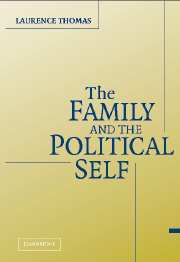Chapter 2 - Reconceptualizing the Moral Self
Published online by Cambridge University Press: 05 June 2012
Summary
The parenting of a child is unique in many ways. One of the most striking of these, however, is that it allows for the fullest expression of unconditional love without in any way failing to respect the child's autonomy. For children, unlike adults, do not have the capacity to be autonomous. If there exists unconditional love in other contexts, the expression of that love must be restrained so as to respect the autonomy of the person who is the object of that love. Children are the perfect vessels for unconditional love. Although born without it, they are marvelously responsive to it. There is no other class of creatures known to humanity that is as responsive to unconditional love as children are. What is more, when children are the object of such love, a nearly immutable foundation is laid for them to become morally autonomous individuals. Significantly, although there are many marvelous roles that individuals, such as teachers and friends, can play in the life of a child, it is the role of parent that is most suited to bestowing unconditional love upon the child. Parents as such are suited to do this, whatever their station in life might be.
PARENTING AS THE FULLEST EXPRESSION OF UNCONDITIONAL LOVE
No matter how much two adults love one another – be it as spouses, siblings, or friends – neither adult is, in the name of that love, justified in imposing her or his conception of the good upon the other.
- Type
- Chapter
- Information
- The Family and the Political Self , pp. 49 - 80Publisher: Cambridge University PressPrint publication year: 2006

